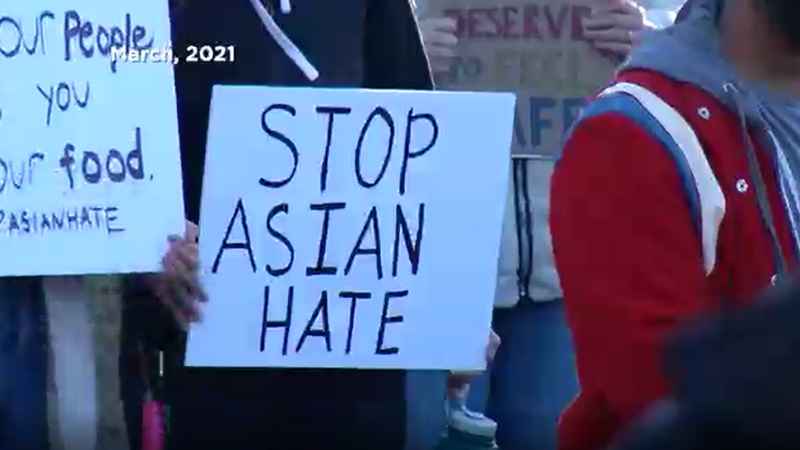Movement to fight hate crimes against Asian Americans building from community to Congress
[anvplayer video=”5028869″ station=”998122″]
Through experiencing a culture you’re perhaps unfamiliar with, you can help in the fight to end anti-Asian American hate crimes right from your home.
The Minnesota Rice project was organized by some of the metro’s most successful chefs and bartenders – all are Asian American.
For at least $100 through the month of May – which is also Asian American Pacific Islander (AAPI) Heritage Month – you can have access to virtual cooking and bartending videos.
“They saw the rise in anti-Asian sentiment and violent crimes and wanted to do something about it,” Jonathon Janssen, bar and product manager with Brother Justus Whiskey Company, said about the organizers.

[KSTP]
Janssen is also one of the bartenders contributing to Minnesota Rice.
“My recipe specifically was a soy-ginger old fashion,” Janssen said.
Those who contribute to the project will be able to learn how to create the cocktail.
Bringing awareness to the spike in hate crimes against the AAPI community is a big part of the project, but Janssen says it’s also aimed to help the community better understand what he and others who are Asian American contribute.
“I think the big opportunity we have with Minnesota Rice is just helping people appreciate what Asian Americans bring to the community and how we contribute,” Janssen said “It’s not just good food and drinks, it’s providing jobs [and] having businesses.”
Minnesota Rice isn’t the first push to bring awareness and support to the AAPI community. The Coalition of Asian American Leaders (CAAL) has been a pillar in the Asian American community for years.
Money raised from Minnesota Rice will benefit CAAL.
“The way in which we create change, and we’ve seen this throughout history, it’s everyday people stepping up and doing something about it,” Nick Kor, senior manager of movement building with CAAL, said.
“We’re living in a moment right now that is seeing heightened attention around a lot of these different issues,” Kor said about the opportunity to create meaningful change right now.
Minnesota Rice was organized following the shooting deaths of eight people at three different massage businesses in Georgia in March – six of the victims were Asian women.
From the community level, all the way to the U.S. Capitol, there is work being done to combat the hate. Just last month – in an overwhelming show of bi-partisan support – the U.S. Senate passed a bill to address the spike in hate crimes.
Also, right now, in both the Minnesota House and Senate there is legislation that would:
- Expand the reporting system for crimes of bias
- Update training for law enforcement in recognizing, responding to, and reporting crimes of bias
One major part of the national bill would require the Department of Justice (DOJ) to get involved and assign a person to help with an expedited review of hate crimes.
Former U.S. Attorney for Minnesota Erica MacDonald said getting the DOJ in the mix will be key in this fight.
That’s why she, and 119 other former U.S. Attorneys, signed an open letter to make that clear and denounce the violence. It too was prompted following the shooting deaths in Georgia.
“For me, it was really important that I make it clear that this is not a partisan issue,” MacDonald said. “[Also], that we have to stand together to protect our Asian American Pacific Islander community as we would any other citizen in the state of Minnesota or in the U.S..”
The open letter reads in part:
We, the undersigned, are former United States Attorneys from both Democratic and Republican Administrations. We are men and women. We are from the North and South. The East and West. We are every color and every religion. We are gay and straight. We are from different generations. We are conservative, moderate, and progressive. And in these hyper-partisan and divisive times, we may disagree on a lot. But we agree on this: We are united in supporting the Asian American, Native Hawaiian, and Pacific Islander communities as we mourn together.
It highlights historical struggles the AAPI community has dealt with and then calls on the DOJ:
We vow to reach out and to listen better – and to act. And we call on the Department of Justice to redouble its efforts to work with and encourage its state and local partners to do even more to address acts of hatred and bigotry, including by maintaining and providing better data regarding them.
The letter ends with a message for those who spew and act with hate:
We are aware of what you are doing, there are far more of us than there are of you, and now, we are more united than ever.
By having the DOJ involved, MacDonald says this will strengthen the effort as it brings all levels of law enforcement on the same page.
“When the DOJ makes it a priority, each U.S. Attorney should make it a priority, and then we will have a coordinated response with the backing of all law enforcement," she said.
Despite the spike in hate crimes against the AAPI community, MacDonald says these incidents have been underreported historically. From a lack of trust in law enforcement and the government to the community simply not coming forward to share their stories, she hopes the current momentum and efforts will change that.
That’s another goal with Minnesota Rice: start and continue conversations to help stop Asian American Pacific Islander hate crimes. To be part of it, click here.